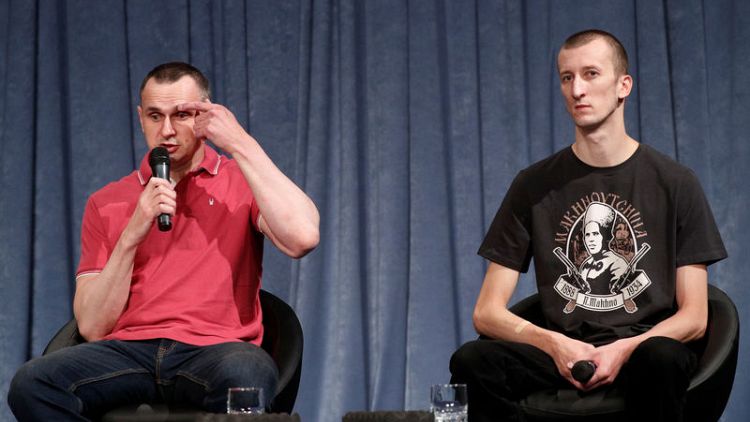By Ilya Zhegulev
KIEV (Reuters) - Ukrainian filmmaker Oleg Sentsov plans to start making films again and to champion the rights of prisoners in Russian jails, he said on Tuesday, days after being freed in a landmark prisoner exchange between Ukraine and Russia.
Sentsov was the most high-profile prisoner to be swapped on Saturday among 35 Ukrainian detainees to return home in exchange for an equal number of prisoners wanted by Russia.
The 43-year-old filmmaker was detained in Crimea in 2014 and sentenced to 20 years in a maximum security prison on terrorism charges which he says were trumped up. The European Union said the case was "in breach of international law" and the U.S. State Department called it a "clear miscarriage of justice".
He went on hunger strike and his fate became a rallying cry for Ukraine in its conflict with Russia over Moscow's 2014 annexation of Crimea and support for separatists in the Donbass region, in a conflict that has killed more than 13,000 people.
The prisoner swap was welcomed in the West and could help thaw out bilateral relations, although a full normalisation of ties is a long way off. The next step could be a meeting between Ukrainian President Volodymyr Zelenskiy and his Russian counterpart Vladimir Putin.
Sentsov plans to use his freedom to publish a book and start shooting a film, as well as to champion the rights of Ukrainian prisoners of war and Russian political prisoners, with whom he said he feels solidarity.
"I already said that I myself will do everything to raise awareness about this problem, to keep up people's interest in our prisoners and Russian prisoners," he said.
"All of them are prisoners of the Kremlin, they are people who suffer from Putin, and they need help. Our people are certainly closer to us, but those people are also human beings and they are our people as well."
Sentsov said he didn't feel any excitement until he hugged his daughter after getting off the plane that brought him home.
"My main feeling was that it was one of those days life is worth living for," he said.
Sentsov spent his jail time writing letters, a screenplay, books and a daily diary, filling 15 notebooks. He brought two bags back with him, one filled solely with his prison papers and weighing 22kg (48 pounds), he said.
"Every day, I wrote a diary without knowing what would happen to me," he said, adding that letters were also a lifeline and that he had tried to answer as many as possible.
"In jail, receiving letters is very important," he said.
"You can survive without food for a day. But everyone is waiting for a letter."
(Additional reporting by Natalia Zinets; Editing by Matthias Williams and Hugh Lawson)


